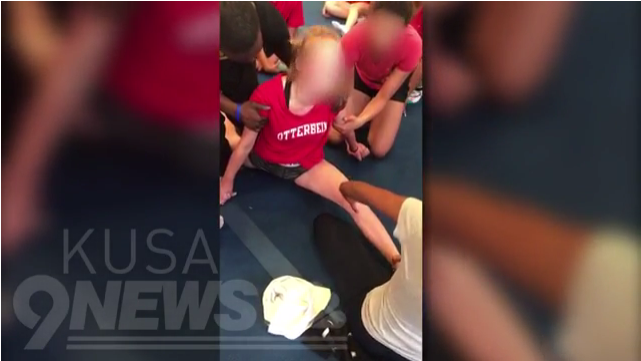The disturbing East High School cheer videos 9Wants to Know exposed this week should be a part of a bigger nationwide conversation about how coaches are trained - that’s according to Brian Gearity, an expert in coaching education and development at DU’s graduate school of professional psychology.
Gearity is a Clinical Assistant Professor with Master of Arts in Sports Coaching.
He saw videos of East High School cheer coach Ozell Williams' use of a forced splits technique that brought students to tears.
“Here we are again in 2017 with really abusive and poor coaching practice,” Gearity said. “This should not happen at all. What's disturbing, is we keep having the same conversation every few months, every six months, something gets taped or finally a story, because enough people speak out and they can't cover it up anymore and we shine a light on these things.”
He added the video showing Williams and his cheerleaders should force educators, coaches and legislators to change how things are done.
“Thinking about this incident, what meaningful reform are we going to have?” Gearity asked. “Is anybody in Colorado or nationally is going to have a national conversation as well as a local conversation on ‘we're not regulating our coaches, especially our youth coaches, we're not regulating them at all.’ We need to have better preparation before they go have their hands on anybody. There needs to be accountability and regulation, professional development, continuing education. There needs to be oversight.”
Williams is CHSAA (Colorado High School Activities Association) certified. He took their two-day course to learn the rules and took an online test. But Gearity said that is not enough. “It’s time to stop treating coaching like a weekend workshop and more like a true profession that has rigorous standards and accountability,” Gearity said.
He added he was concerned there was no state-wide or a national registry to check someone's background before hiring a coach.
9Wants to Know has learned before Williams worked at East High School he was dismissed from Boulder High School after a coach there saw him using the same technique we saw in this week's videos.
FULL REPORT | East High cheerleading coach fired after video showing 'forced splits,' superintendent says
After 9NEWS aired the story, Gearity wrote us an additional email. You can read it in its entirety below:
“I just watched the CHSAA commissioner’s response that was on the 9NEWS site. It points to the problem I spoke of. Somebody gets “coach training” but it’s not sufficient and not quality training. She referred to “common sense” but that lacks precision and clearly common or good sense wasn’t used, and now this coach could still continue to be employed, use these practices, etc. It does little to solve the problem of coach education, regulation and oversight, and continuing education. We don’t have the research to know how often these sorts of things occur, but it’s far from uncommon. Licensure can help set a baseline education and professional standards.CHSAA is an affiliate of the National Federation ofSate High School Associations (NFHS) coaches, the largest governing body for school based sports in the U.S.
The NFHS, like the NCAA, and other national governing bodies could be more progressive, but they’re in a difficult situation trying to juggle their mission and the needs of their member schools and coaches with their need for self-preservation.
Nobody is perfect, but we’re not solving the underlying problem of the lack of professionalization and standards insport coaching. There are many well intended people trying to make the best of a dysfunctional system, and of course, there are some quality coaches out there and I’ve had the opportunity to coach alongside several of them. However, we can do better by creating a more independent body that oversees the professionalization, regulation, and professional development of sport coaches. We need higher standards set forth by a more independent commission that would include wide representation from the aforementioned stakeholders. I think we owe it, in particular to the young people we supposed to be serving, to make sure their needs are being served through the highest standard of care through quality coaching.DPS response points to the culture of performance. In the name of performance and profit we’re abusing children, adolescents, and adults. Here’s a new article in Time about the $15 billion dollar youth sport industry: http://time.com/4913687/how-kids-sports-became-15-billion-industry/Take for example the DU Law Professor that talked about “duty to report.” This legal concept came to light again after the sexual abuse at Penn State. Why didn’t anybody report or say anything? In fact, the young assistant coach on staff did, but it stopped there. By and large, I would bet many coaches and sport workers do not know about this legal statute, rarely enforce it, and if we refer back to that same ‘common sense’ comment that what’s common is abuse and poor practices and judgment; the world of sport has normalized abuse to the extent that it’s hard to know it when we see it. Even if we regulate the coaches, who’s regulating the administrators and business owners? What qualifies them to oversee coaches?We’re missing the boat if we consider this an isolated incident. In addition to coach education, I’d go so far as to argue we need standards for business, school, non-profits—in short—anybody who deals with sport need some standard of care. Wouldn’t it be great to know that any vetting or hiring process of a coach was ensured that the coach had a rigorous education and license to help ensure competence and safe practice? Instead, national governing bodies, schools, etc. say something that sounds good, but often has little substance and certainly little assurance of the coach’s minimum qualifications to practice (i.e., licensure).”


